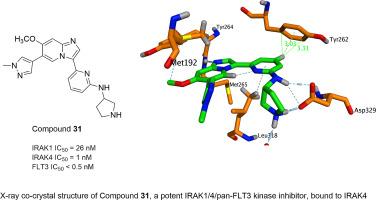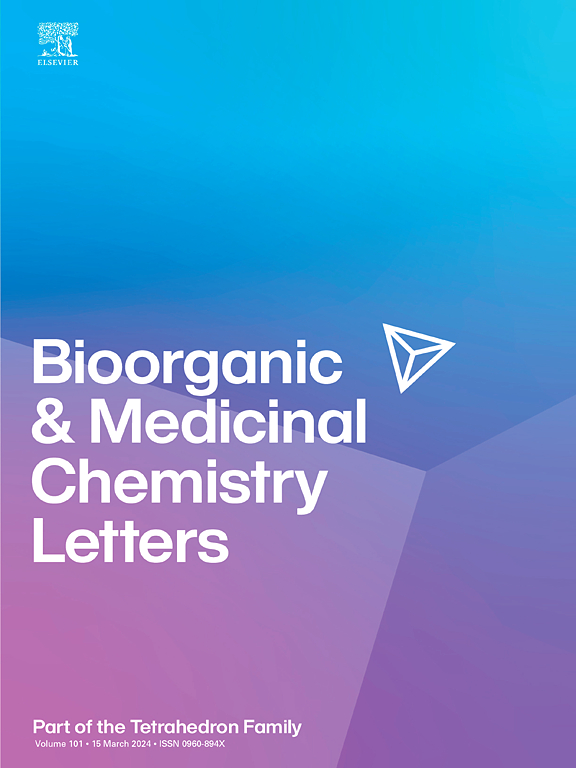IRAK1/4/pan-FLT3激酶抑制剂治疗急性髓性白血病的优化研究
IF 2.2
4区 医学
Q3 CHEMISTRY, MEDICINAL
引用次数: 0
摘要
FLT3激酶抑制剂已作为急性髓性白血病(AML)的靶向治疗进展到临床。这些抑制剂可以产生有希望的初始反应,但患者经常复发为治疗抵抗性疾病。导致复发的一个重要因素涉及通过IRAK1和IRAK4激酶介导的替代途径的适应性信号传导。因此,与仅抑制FLT3的化合物相比,抑制IRAK1/4和FLT3的化合物可能具有更好的疗效。我们报道了咪唑吡啶系列IRAK1/4/pan-FLT3激酶抑制剂的优化。优化工作已经产生了关键化合物31,它显示出对IRAK1、IRAK4和FLT3的有效抑制,在多种AML肿瘤细胞活力测定中显示出有效的活性,并且在多种小鼠AML异种移植模型中的疗效优于已批准的FLT3抑制剂。本文章由计算机程序翻译,如有差异,请以英文原文为准。

Optimization of IRAK1/4/pan-FLT3 kinase inhibitors as treatments for acute myeloid leukemia
FLT3 kinase inhibitors have been advanced to the clinic as targeted treatments for acute myeloid leukemia (AML). These inhibitors can produce promising initial responses, but patients often relapse with treatment-resistant disease. A significant factor contributing to relapse involves adaptive signaling through an alternative pathway mediated by IRAK1 and IRAK4 kinases. Compounds that inhibit IRAK1/4 and FLT3 may thus provide superior efficacy relative to compounds that inhibit FLT3 only. We report the optimization of an imidazopyridine series of IRAK1/4/pan-FLT3 kinase inhibitors. Optimization efforts have produced key compound 31, which displays potent inhibition of IRAK1, IRAK4, and FLT3, potent activity in multiple AML tumor cell viability assays, and efficacy superior to that of approved FLT3 inhibitors in multiple mouse xenograft models of AML.
求助全文
通过发布文献求助,成功后即可免费获取论文全文。
去求助
来源期刊
CiteScore
5.70
自引率
3.70%
发文量
463
审稿时长
27 days
期刊介绍:
Bioorganic & Medicinal Chemistry Letters presents preliminary experimental or theoretical research results of outstanding significance and timeliness on all aspects of science at the interface of chemistry and biology and on major advances in drug design and development. The journal publishes articles in the form of communications reporting experimental or theoretical results of special interest, and strives to provide maximum dissemination to a large, international audience.

 求助内容:
求助内容: 应助结果提醒方式:
应助结果提醒方式:


